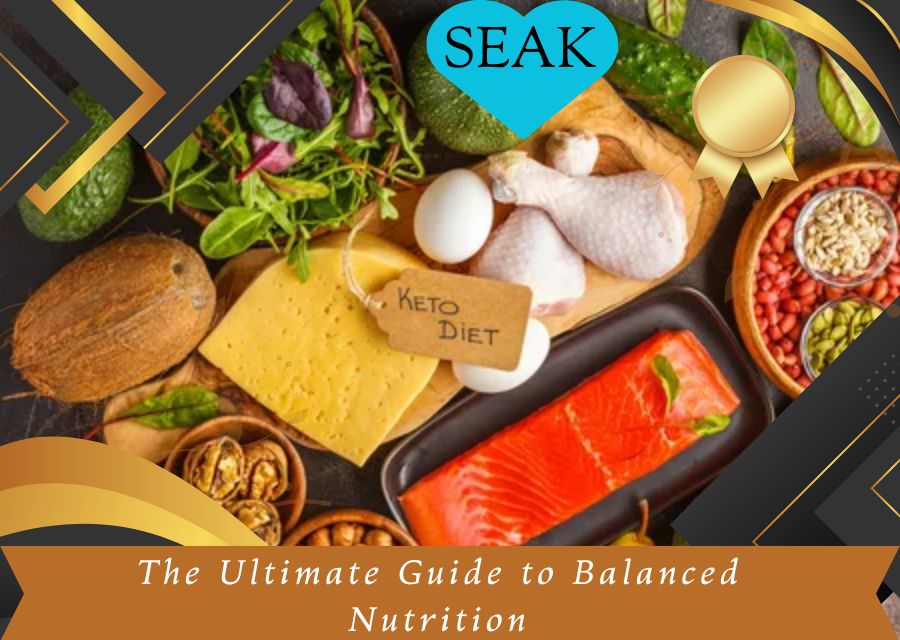Achieving balanced nutrition is crucial for maintaining good health and overall well-being. This comprehensive guide will walk you through the fundamentals of balanced nutrition, practical tips for incorporating it into your daily life, and the benefits you can expect. Whether you’re looking to improve your diet or gain a deeper understanding of nutrition, this guide is here to help.
What is Balanced Nutrition?
Balanced nutrition involves consuming the right amounts of nutrients to maintain optimal health. It means getting the right proportions of carbohydrates, proteins, fats, vitamins, and minerals that your body needs to function correctly.
Carbohydrates: The Energy Source
Carbohydrates are the body’s primary energy source. They are found in foods such as bread, rice, pasta, fruits, and vegetables. Carbohydrates can be classified into simple and complex carbs. Simple carbs are quickly absorbed, providing a rapid energy boost, while complex carbs are digested slowly, offering sustained energy.
Proteins: The Building Blocks
Proteins are essential for growth, repair, and maintenance of body tissues. They are made up of amino acids, some of which are essential, meaning they must be obtained from the diet. Protein sources include meat, fish, eggs, dairy products, legumes, and nuts.
Fats: Essential for Health
Fats are a vital part of a balanced diet, providing energy, supporting cell growth, and protecting organs. They also help in absorbing vitamins. Healthy fats include unsaturated fats found in olive oil, avocados, and nuts, while saturated fats, found in butter and red meat, should be consumed in moderation.
Vitamins and Minerals: The Micronutrients
Vitamins and minerals are crucial for various bodily functions, including immune support, bone health, and wound healing. They are found in a wide range of foods, including fruits, vegetables, dairy, and meat. Each vitamin and mineral has specific roles, and deficiencies can lead to health problems.
Creating a Balanced Diet
Creating a balanced diet involves understanding and implementing the right proportions of these nutrients. Here are some steps to help you achieve a balanced diet:
Understand Your Nutritional Needs
Nutritional needs vary based on age, gender, activity level, and health status. Understanding your specific needs can help tailor your diet for better health. Consult with a healthcare provider or a nutritionist to get personalized recommendations.
Incorporate a Variety of Foods
Eating a variety of foods ensures that you get a wide range of nutrients. Aim to include different food groups in your meals:
- Fruits and Vegetables: These should make up a large part of your diet. They are rich in vitamins, minerals, and fiber.
- Whole Grains: Opt for whole grains like brown rice, whole wheat bread, and oatmeal instead of refined grains.
- Proteins: Include both animal and plant-based proteins in your diet.
- Dairy: Choose low-fat or fat-free dairy options to reduce saturated fat intake.
Portion Control
Eating the right portion sizes can help maintain a healthy weight and prevent overeating. Use smaller plates, pay attention to hunger cues, and avoid eating out of boredom.
Limit Processed Foods
Processed foods often contain added sugars, unhealthy fats, and high levels of sodium. Limiting these can help improve your overall health. Choose whole, unprocessed foods whenever possible.
Stay Hydrated
Water is essential for all bodily functions. Aim to drink at least 8 glasses of water a day, and more if you are physically active or live in a hot climate.
Practical Tips for Balanced Nutrition
Incorporating balanced nutrition into your daily life doesn’t have to be complicated. Here are some practical tips to help you get started:
Plan Your Meals
Planning your meals ahead of time can help ensure that you include a variety of nutrients. It also helps in making healthier food choices and can save time and money.
Cook at Home
Cooking at home gives you control over what goes into your food. It can help you avoid unhealthy ingredients and make it easier to include more fruits, vegetables, and whole grains in your diet.
Read Food Labels
Understanding food labels can help you make healthier choices. Look for foods that are high in fiber, vitamins, and minerals, and low in added sugars, saturated fats, and sodium.
Snack Wisely
Choose healthy snacks such as fruits, nuts, yogurt, or whole grain crackers instead of chips or candy. This can help maintain energy levels throughout the day.
Practice Mindful Eating
Pay attention to what you eat and how you eat. Eat slowly, savor your food, and listen to your body’s hunger and fullness cues.
Benefits of Balanced Nutrition
Adopting a balanced diet has numerous health benefits, including:
Improved Energy Levels
A balanced diet provides the nutrients your body needs to produce energy. This can help you feel more energetic and reduce fatigue.
Better Mental Health
Proper nutrition is linked to better mental health. Nutrients such as omega-3 fatty acids, vitamins, and minerals play a role in brain function and can help reduce symptoms of depression and anxiety.
Weight Management
Eating a balanced diet can help you maintain a healthy weight. It can prevent overeating and ensure you get the right amount of calories and nutrients.
Reduced Risk of Chronic Diseases
A diet rich in fruits, vegetables, whole grains, and lean proteins can lower the risk of chronic diseases such as heart disease, diabetes, and certain cancers.
Stronger Immune System
A balanced diet supports a healthy immune system, helping your body fight off infections and illnesses more effectively.
Conclusion
Balanced nutrition is essential for maintaining good health and well-being. By understanding your nutritional needs, incorporating a variety of foods, practicing portion control, and making healthier food choices, you can achieve a balanced diet. The benefits of balanced nutrition are far-reaching, impacting your energy levels, mental health, weight management, and overall risk of chronic diseases. Start making small changes today and enjoy the positive effects of a well-balanced diet on your life.
